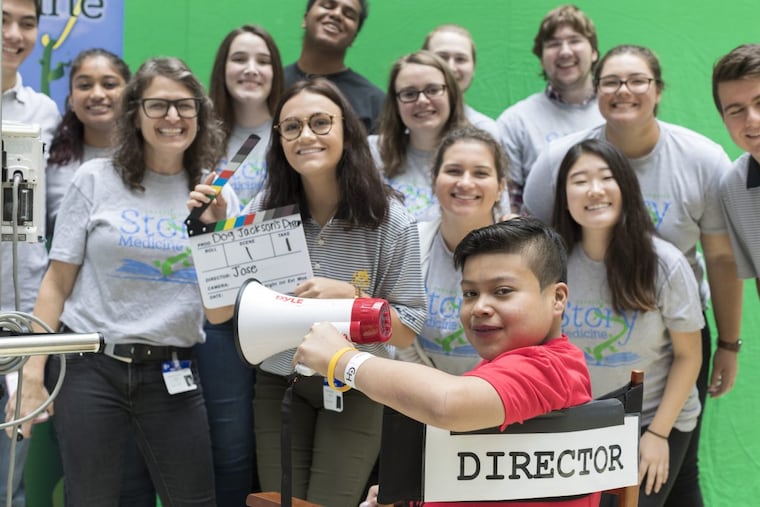How Drexel students are helping kids at CHOP direct their own life stories
The goal of the animated shorts project is to offer long-term patients at CHOP a way to process their experiences and help them cope with their treatment.

Jose Tomas Crisostomo Flores is a 12-year-old boy from Camden who loves Michael Jackson and dreams of being a famous singer and dancer. He is also a long-term cardiac patient at The Children's Hospital of Philadelphia, who, for the past four months – his most recent stint – has been waiting for a heart transplant.
His mother sleeps in his hospital room each night. His father and younger brother visit on weekends. If Jose leaves CHOP, he will slide down the list of those waiting for donor hearts.
Jose said he gets frustrated being in the hospital so long. But working with hospital staff and Drexel University undergraduate students to turn his story into a two-minute animated film has made the wait more bearable.
"I want everybody to know about my life," the boy said.
The animated shorts project offers patients a way to process their experiences and help them cope with their treatment. "It's a very unique, creative outlet," said Kent Wyckoff, production lead for patient media and entertainment at the hospital. "All of these patients have amazing personalities, and this is a way for them to jump out at you."
At the same time, the Drexel students get to practice empathy, problem-solving and collaboration, among other life skills. "They're learning about resilience from the kids here," said Nomi Eve, who teaches a course called Story Medicine, from which the animated shorts project emerged.
As part of Drexel's community-based learning program – in which students split their time between traditional classrooms and community partners – Story Medicine students have visited CHOP twice a week for the past two years to write and produce shows that patients watch in their rooms.
Eve recalled one patient at CHOP who shared her story with the students, explaining that she was in the hospital to donate bone marrow to her brother.
"I'll never forget that moment," Eve said. "Look what that child gave our students at that moment, and our little show was able to provide a way for her to tell her story."
Pre-med student Victoria Milano, 19, had three heart surgeries in high school and another one this summer.
"Victoria has really connected with Jose in a special way," Eve observed. "His story incorporates his own situation, and Victoria was able to say, 'Me, too.' "
Milano's experience at CHOP has sparked her interest in pediatrics. "Being here, I want to go study hard because this is where I want to be in the future," she said.
For this year's animated shorts project, students worked with patients to write scripts, which they translated into storyboards. Wyckoff and his crew helped the patients turn their storyboards into a series of rough live-action shots, using the students as stand-in actors. Drexel animation students transformed these shots into animated shorts, which they showed to the patients and their families at a mid-December screening in CHOP's studio.
"Their smiles were so awesome," Eve said.
Jessica Toscano, 18, who is awaiting a kidney transplant at CHOP wrote her script about a flying pig, "because everyone says like, 'When pigs fly.'"
Jessica knows about getting over seemingly impossible hurdles.
At 10, she developed acute liver failure for unknown causes and received a transplant, but fought rejection for three years. Anti-rejection drugs enabled her liver to regenerate itself, but soon she contracted an infection. The drugs used to fight the infection combined with the anti-rejection drugs caused her kidneys to fail.
"She's in a very bad depression," said Jessica's mother, Linda Toscano. "She has medical PTSD."
The animated short project gives Jessica a chance to do something fun with peers.
"She has nothing normal in her life," Linda Toscano said. "Can you imagine being 17 and 18 and all your friends are going to the prom, and you're hanging out with your parents? She really has no control over anything."
The animation project gives patients a kind of autonomy they may rarely experience.
On a recent morning Jose walked into the hospital's multimedia studio to a thunder of applause from the students. He rolled his I.V. in on a poll, beaming as he settled into the director's chair.
"You ready to yell at some people?" Wyckoff asked, handing Jose a megaphone.
In Jose's script, a character named Dog Jackson (the animal version of Michael Jackson) says that he's always wanted to be a singer and dancer but that he was born with a heart problem. So he went to CHOP and got a new heart. "I finally feel ready to do what I was meant to do," Dog Jackson says. "Being here is a dream come true."
Drexel senior Kate Howarth was acting the part of "Piggie Wonder," (i.e. Stevie Wonder) wearing a rasta wig, a pig's snout and John Lennon-style sunglasses. Jian White, also a senior, was playing "Dog Jackson," sporting one surgical glove as he lip-synched "Man in the Mirror."
"Come on! Move!" Jose shouted through the megaphone, spurring White into more elaborate gyrations in front of the whooping crowd.
At the end of the shoot, Wyckoff and Jose high-fived. The Drexel students sang a popular soccer anthem, substituting the word "Jose" for "Ole."
"I think this is everything for him," said Danielle Gaudette, a CHOP nurse who works with Jose. "Just being in the room all day, you can get really down."
But Jose never stays down for long, she said, even singing tunes from The Beatles and John Legend for the nurses.
"I want to come back here and sing to everybody, to all the children, and donate a little money," Jose said. "That's my dream. I like to see children's happiness."